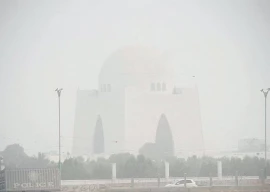
LAHORE:
The breaches in the Taunsa Barrage during last year’s floods were not made under pressure from influential landlords wanting to protect their valuable agricultural land, but happened because of a long history of mismanagement of barrages and embankments by the Irrigation and Power Department, the Flood Inquiry Tribunal of the Lahore High Court found.
“The popular notion that the breach of the LMB [Left Marginal Bund] at Taunsa Barrage was under political duress in order to save valuable land on the right side of the Barrage was not substantiated by the evidence before us,” reads the tribunal’s report, which was released on Thursday. The tribunal was meant to investigate the causes of the major breaches along the Indus during the floods.
The tribunal slammed the Irrigation Department and other government institutions for failing to a proper flood management plan and warned that if one were not prepared, “an abundance of water” would be wasted down the Arabian Sea in coming years, and cause “ghastly havoc” in floods. It recommended that the irrigation secretary be replaced and other officials be punished. “We found our flood guardians off guard,” it said.
The tribunal said that at Jinnah Barrage, the weir gates (right side) remained closed during medium flood, generating pressure on the Left Guide Bund (LGB). The absence of reserve stones made the flood fighting plan ineffective.
“At Taunsa Barrage, the confusing management structure under the project management officer (PMO), violation of regulations and poor flood-fighting resulted in the collapse of the LMB at RD 32-33 and then subsequently at RD 34-40,” says the report.
The Jampur Bund was breached at many places, again, due to poor maintenance, weak vigilance and shoddy pre-flood preparedness. The Fakhar Flood Bund was breached due to overtopping, again for similar reasons. “The pond area on both sides … is encroached by influential locals of the area, seemingly in collusion with the Irrigation and Power Department,” says the report.
The report condemned the department, the Federal Flood Commission and the Planning Commission for not developing a proper plan to cope with floods. The FFC’s National Flood Protection Plans I, II and III, it said, were “a huge misnomer” and just a start. The closest thing to a proper plan was a draft national water policy which has awaited approval since 2005. “Shameful neglect indeed,” says the report.
The Irrigation and Power Department, it said, has not even factored in its flood fighting strategy or future water management strategy. “The flood managers, besides being reckless and complacent, did not possess the requisite professional education or experience to merit posting on a barrage or an embankment,” it said.
The report recommended that flood plains be clearly mapped, zoned and demarcated, that structures built on them be subjected to special regulations, and that farmers be encouraged to get crop insurance.
The tribunal was headed by Justice Syed Mansoor Ali Shah and included Abdul Sattar Shakir and Shafqat Masood. The home secretary was given a copy of the report in April, but the government did not release the findings. “However, strong criticism from the media and public compelled the Punjab government to request the LHC to make public the report of the flood tribunal,” said a letter accompanying the report.
The Home Department wrote to the tribunal registrar saying “the competent authority” had approved action against officials in light of the inquiry. The government would legislate to map the flood plains, create wildlife sanctuaries and protect the environment of the river areas.
“The pond area at Head Rasul, not yet handed over to the Privatisation Board, may be exempted from privatisation,” it said.
Published in The Express Tribune, July 1st, 2011.


















































COMMENTS
Comments are moderated and generally will be posted if they are on-topic and not abusive.
For more information, please see our Comments FAQ